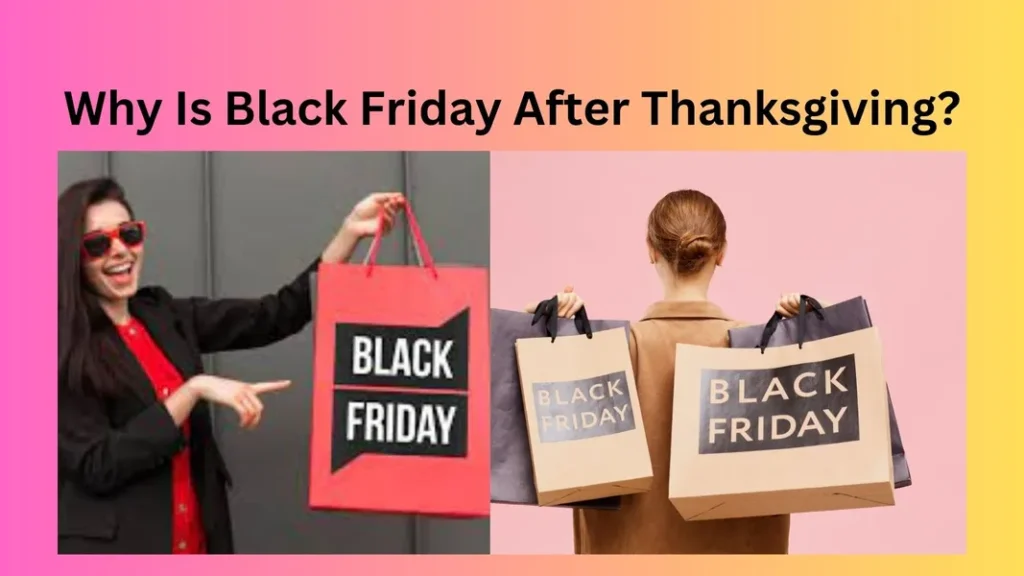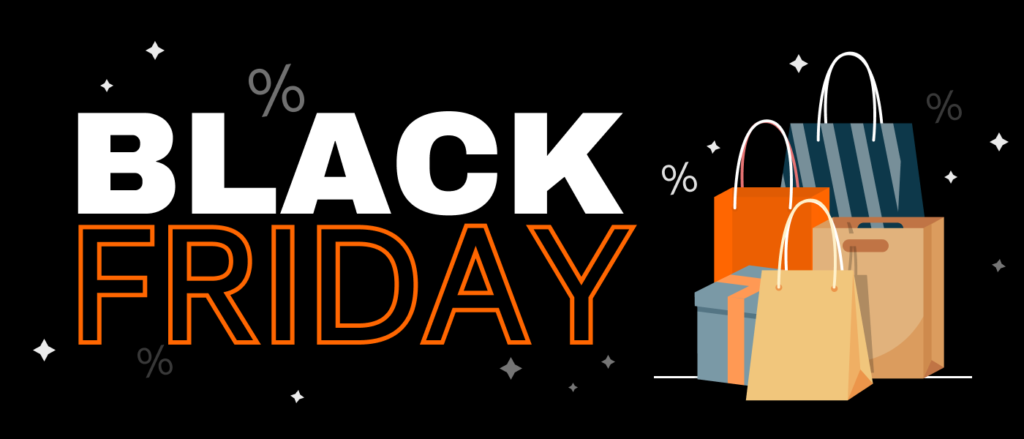Ah, Black Friday—the unofficial kickoff to the holiday season. A day of epic sales, bustling crowds, and perhaps even a sprinkle of retail chaos. But have you ever paused to wonder why this shopping extravaganza lands right after Thanksgiving? Why not a week later? Or before Thanksgiving? There’s more to this timing than meets the eye. Let’s dive into the fascinating history, psychology, and retail strategy behind this global shopping phenomenon.

1: A Glimpse Into Black Friday’s History
1: The Origins of Black Friday
Black Friday wasn’t always the beacon of discounts and deals we know today. In fact, the term dates back to the 1950s in Philadelphia. Police officers coined the phrase to describe the chaotic day after Thanksgiving when hordes of shoppers flooded the city ahead of the Army-Navy football game. Doesn’t sound so glamorous, does it?
2: From Chaos to Commerce
Retailers saw an opportunity amidst the mayhem. By the 1980s, the narrative shifted. Instead of focusing on traffic jams and chaos, “Black Friday” became synonymous with profits and the idea of being “in the black” (accounting speak for turning a profit). It was a genius rebranding that catapulted the day into retail legend.
2: Why Is Black Friday After Thanksgiving?
1: The Thanksgiving Connection
The answer is deeply rooted in tradition. Thanksgiving marks the unofficial end of autumn and the beginning of the holiday season. What better time to kick off holiday shopping than the day after a feast with family and friends? It’s almost like a seamless transition from gratitude to gifting.
2: Timing Is Everything
Retailers capitalized on this timing, recognizing that shoppers are already in a celebratory mood. Thanksgiving provides a natural pause in the year—a perfect opportunity for families to plan their shopping spree.
3: A Psychological Push
Think about it: after indulging in a Thanksgiving feast, you’re relaxed, happy, and perhaps a little more willing to splurge. The timing makes psychological sense—it’s like retailers knew your post-pumpkin pie brain would be ready to spend!
3: The Evolution of Black Friday Sales
1: From One Day to a Weeklong Event
Black Friday used to be a one-day affair. But as competition grew fiercer and online shopping emerged, retailers began extending the sales. Now, you’ll often hear about “Black Friday Week” or even “Black November.” It’s as if one day just wasn’t enough to contain the shopping frenzy!
2: Cyber Monday Joins the Party
And let’s not forget Cyber Monday, the online shopping counterpart to Black Friday. While Black Friday remains tied to brick-and-mortar stores, Cyber Monday swooped in to grab the online crowd. Together, they create a retail one-two punch.
3: Global Spread of Black Friday
Though it started in the U.S., Black Friday has spread worldwide. Countries like the UK, Canada, and even Australia now embrace the tradition. The timing after Thanksgiving remains the same, even for countries that don’t celebrate the holiday.

4: The Retailer’s Perspective
1: Why Retailers Love Black Friday
For businesses, Black Friday is like the Super Bowl of sales. It’s a chance to clear out inventory, attract new customers, and boost year-end profits.
2: Creating Urgency
Ever noticed those “limited time only” deals? Retailers create a sense of urgency to get you to buy now. And the timing right after Thanksgiving is perfect for tapping into holiday shopping anxiety—everyone wants to snag the best gifts before they’re gone.
3: The Power of Tradition
Year after year, shoppers expect Black Friday deals. Retailers can count on this tradition to bring in massive crowds, both in stores and online.
5: The Shopper’s Mindset
1: A Thanksgiving Tradition
For many families, Black Friday shopping is as much a tradition as the Thanksgiving turkey. Some map out their shopping routes, while others cozy up with their laptops for online deals.
2: The Allure of Discounts
Let’s be real—who doesn’t love a good deal? Black Friday offers deep discounts that feel like a reward for waiting all year. And because it’s right after Thanksgiving, it feels like a head start on holiday shopping.
3: FOMO (Fear of Missing Out)
Ever felt the pressure to grab a deal before it’s gone? You’re not alone. Black Friday thrives on this FOMO, making shoppers feel like they can’t afford to wait.
6: Thanksgiving and Black Friday: A Perfect Pair
1: The Holiday Spirit
Thanksgiving sets the stage for gratitude and togetherness, which naturally transitions into the holiday spirit. Black Friday feeds off this energy, turning goodwill into shopping power.
2: A Long Weekend Bonus
For most Americans, Thanksgiving means a long weekend. The day after Thanksgiving is a convenient time to shop—no work, plenty of sales, and maybe even a chance to burn off some of those mashed potatoes.
3: A Cultural Phenomenon
Black Friday is more than a shopping day; it’s a cultural event. It brings people together, whether they’re braving the crowds or sharing online deals from the comfort of home.
7: The Dark Side of Black Friday
1: Retail Mayhem
Of course, not everything about Black Friday is rosy. We’ve all seen the videos of stampedes and arguments over TVs. The timing after Thanksgiving sometimes brings out the worst in shoppers.
2: Consumerism Overload
Some critics argue that Black Friday overshadows the true meaning of Thanksgiving—gratitude. It can feel like we’re rushing from thankfulness to materialism.
3: Environmental Impact
All those sales lead to a surge in production, packaging, and shipping. Black Friday’s environmental impact is a growing concern for many.
8: How to Shop Smart on Black Friday
1: Plan Ahead
Make a list and check it twice—seriously. Knowing what you want helps you avoid impulse buys.
2: Compare Prices
Don’t be fooled by flashy deals. A quick price check can save you from overpaying.
3: Shop Online
Skip the crowds and shop online. Many retailers offer the same deals—or better—on their websites.

Conclusion: The Beauty of Balance
So, why is Black Friday after Thanksgiving? It’s the perfect storm of history, psychology, and retail strategy. Thanksgiving sets the stage for a day of gratitude, and Black Friday swoops in to turn that energy into action. Whether you’re a die-hard shopper or someone who prefers to stay home, there’s no denying the impact of this day on our culture and economy.
As we head into another Black Friday, let’s remember to keep the spirit of Thanksgiving alive. Sure, snagging deals is great, but it’s the time spent with loved ones—and maybe a little leftover pie—that truly makes this season special.
FAQs
1. Why is it called Black Friday?
The term originally described chaotic post-Thanksgiving crowds but later took on a positive meaning, symbolizing profits for retailers.
2. Is Black Friday only in the U.S.?
Nope! While it started in the U.S., many countries now participate in Black Friday sales.
3. How can I avoid overspending on Black Friday?
Set a budget, make a list, and stick to it. And don’t let those “limited time” deals pressure you!
4. Are Black Friday deals better in-store or online?
It depends on the retailer. Many offer the same deals online, but some in-store promotions are exclusive.
5. Does Black Friday have a negative environmental impact?
Yes, increased production, packaging, and shipping during Black Friday contribute to environmental concerns. Opting for eco-friendly brands or digital products can help.